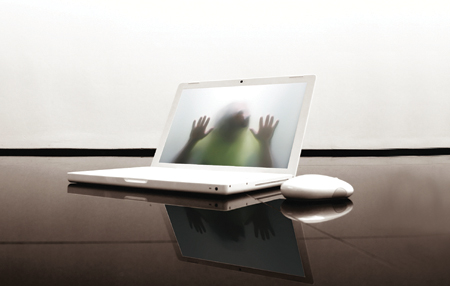Ashley is a high-school junior and she and her friends use MySpace to communicate, but she’s very careful about the information, pictures and comments she sends and posts — even though her profile is set to private. She knows that nothing is ever really private online.
“I know teens who have gotten kicked off their sports teams because of pictures and inappropriate material they have on their profiles,” she says.
Her advice is simple: “Be smart about what you put on the Internet, because you never know who is looking at what you have on there.”
From the first time you log on to a social networking site like Facebook or MySpace, pick a screen name for instant messaging or post to a blog on your favorite band, you’re creating an online identity.
Your online identity may be different from your real-world identity — the way your friends, parents and teachers think of you — and some parts of it may be entirely made up. Maybe you’re a little shy in real life, but online you’re a jokester and your avatar is a famous comedian. Maybe your classmates think of you as a soccer star, but online you indulge your passion for chess and environmentalism.
Playing around and trying on different characteristics are part of the fun of an online life. You can change your look or the way you act and present yourself to others and you can learn more about things that interest you. And, just as in real life, you can take steps to help make sure you stay in control.
Things to Consider
Here are some things to consider to safeguard your online identity and reputation:
- Remember that nothing is temporary online. The virtual world is full of opportunities to interact and share with people around the world. It’s also a place where nothing is temporary and there are no “take-backs.” A lot of what you do and say online can be retrieved online even if you delete it — and it’s a breeze for others to copy, save, and forward your information.
- Mark your profiles as private. Anyone who accesses your profile on a social networking site can copy or screen-capture information and photos that you may not want the world to see. Don’t rely on the site’s default settings. Read each site’s instructions or guidelines to make sure you’re doing everything you can to keep your material private.
- Safeguard your passwords and change them frequently. If someone logs on to a site and pretends to be you, they can trash your identity. Pick passwords that no one will guess (don’t use your favorite band or your dog’s birthday; try thinking of two utterly random nouns and mixing in a random number,) and change them often. Never share them with anyone other than your parents or a trusted adult. Not even your best friend, boyfriend or girlfriend should know your private passwords!
- Don’t post inappropriate or sexually provocative pictures or comments. Things that seem funny or cool to you right now might not seem so cool years from now — or when a teacher, admissions officer or potential employer sees them. A good rule of thumb is: if you’d feel weird if your grandmother, coach or best friend’s parents saw it, it’s probably not a good thing to post. Even if it’s on a private page, it could be hacked or copied and forwarded.
- Don’t respond to inappropriate requests. Research shows that a high percentage of teens receive inappropriate messages and solicitations when they’re online. These can be scary, strange and even embarrassing. If you feel harassed by a stranger or a friend online, tell an adult you trust immediately. It is never a good idea to respond. Responding is only likely to make things worse, and might result in you saying something you wish you hadn’t.
- Take a breather to avoid “flaming.” If you get the urge to fire off an angry IM or comment on a message board or blog, it’s a good idea to wait a few minutes, calm down and remember that the comments may stay up (with your screen name right there) long after you’ve regained your temper and maybe changed your mind.
- Even if your “anonymous,” you can still get hurt. You might feel anonymous or disguised in chat rooms, social networks, or other sites — and this could lead to mean, insulting, or abusive comments toward someone else, or sharing pictures and comments you may later regret. We’ve all heard of cyberbullying, but most people think online bullying is something people do intentionally. But sharing stuff or dropping random comments when we’re not face to face with someone can hurt just as much, if not more. And it can damage how others see you if they find out. A good rule to remember: If you wouldn’t say it, show it, or do it in person, you probably don’t want to online.
- Learn about copyrights. It’s a good idea to learn about copyright laws and make sure you don’t post, share or distribute copyrighted images, songs or files. Sure, you want to share them, but you don’t want to accidentally do anything illegal that can come back to haunt you later.
- Check yourself. Chances are, you’ve already checked your “digital footprint” — nearly half of all online users do. Try typing your screen name or email address into a search engine and see what comes up. That’s one way to get a sense of what others see as your online identity.
- Take it offline. In general, if you have questions about the trail you’re leaving online, don’t be afraid to ask a trusted adult. Sure, you might know more about the online world than a lot of adults do, but they have life experience that can help.
Your online identity and reputation are shaped in much the same way as your real-life identity, except that when you’re online you don’t always get a chance to explain your tone or what you mean. Thinking before you post and following the same rules for responsible behavior online as you do offline can help you avoid leaving an online identity trail you regret.
 High School Illustrated High School Sports Magazine
High School Illustrated High School Sports Magazine

